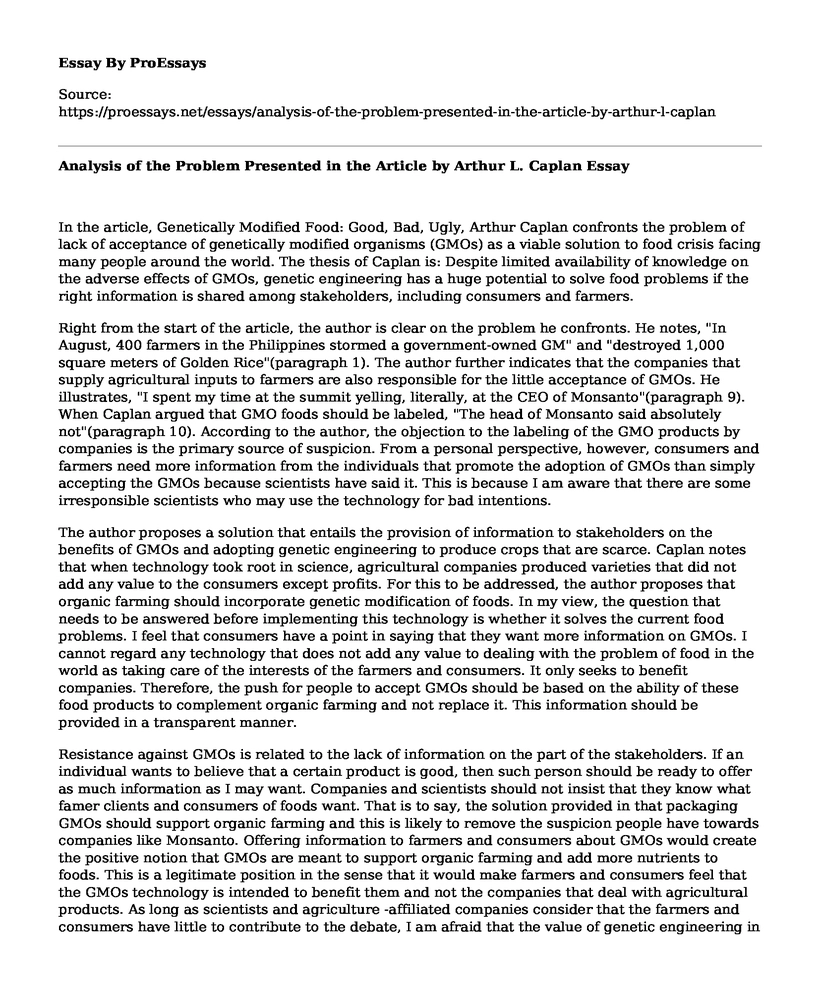In the article, Genetically Modified Food: Good, Bad, Ugly, Arthur Caplan confronts the problem of lack of acceptance of genetically modified organisms (GMOs) as a viable solution to food crisis facing many people around the world. The thesis of Caplan is: Despite limited availability of knowledge on the adverse effects of GMOs, genetic engineering has a huge potential to solve food problems if the right information is shared among stakeholders, including consumers and farmers.
Right from the start of the article, the author is clear on the problem he confronts. He notes, "In August, 400 farmers in the Philippines stormed a government-owned GM" and "destroyed 1,000 square meters of Golden Rice"(paragraph 1). The author further indicates that the companies that supply agricultural inputs to farmers are also responsible for the little acceptance of GMOs. He illustrates, "I spent my time at the summit yelling, literally, at the CEO of Monsanto"(paragraph 9). When Caplan argued that GMO foods should be labeled, "The head of Monsanto said absolutely not"(paragraph 10). According to the author, the objection to the labeling of the GMO products by companies is the primary source of suspicion. From a personal perspective, however, consumers and farmers need more information from the individuals that promote the adoption of GMOs than simply accepting the GMOs because scientists have said it. This is because I am aware that there are some irresponsible scientists who may use the technology for bad intentions.
The author proposes a solution that entails the provision of information to stakeholders on the benefits of GMOs and adopting genetic engineering to produce crops that are scarce. Caplan notes that when technology took root in science, agricultural companies produced varieties that did not add any value to the consumers except profits. For this to be addressed, the author proposes that organic farming should incorporate genetic modification of foods. In my view, the question that needs to be answered before implementing this technology is whether it solves the current food problems. I feel that consumers have a point in saying that they want more information on GMOs. I cannot regard any technology that does not add any value to dealing with the problem of food in the world as taking care of the interests of the farmers and consumers. It only seeks to benefit companies. Therefore, the push for people to accept GMOs should be based on the ability of these food products to complement organic farming and not replace it. This information should be provided in a transparent manner.
Resistance against GMOs is related to the lack of information on the part of the stakeholders. If an individual wants to believe that a certain product is good, then such person should be ready to offer as much information as I may want. Companies and scientists should not insist that they know what famer clients and consumers of foods want. That is to say, the solution provided in that packaging GMOs should support organic farming and this is likely to remove the suspicion people have towards companies like Monsanto. Offering information to farmers and consumers about GMOs would create the positive notion that GMOs are meant to support organic farming and add more nutrients to foods. This is a legitimate position in the sense that it would make farmers and consumers feel that the GMOs technology is intended to benefit them and not the companies that deal with agricultural products. As long as scientists and agriculture -affiliated companies consider that the farmers and consumers have little to contribute to the debate, I am afraid that the value of genetic engineering in food production would continue to face resistance even in days to come.
Works Cited
Caplan, Arthur. "Strands of Promise in Genetically Modified Food." The Chronicle of Higher Education, 9 Sept. 2013, www.chronicle.com/article/Strands-of-Promise-in/141377.
Cite this page
Analysis of the Problem Presented in the Article by Arthur L. Caplan. (2022, Dec 05). Retrieved from https://proessays.net/essays/analysis-of-the-problem-presented-in-the-article-by-arthur-l-caplan
If you are the original author of this essay and no longer wish to have it published on the ProEssays website, please click below to request its removal:
- Meilaender's Readings Review
- Animal Bush Meat and Ethics Essay Example
- Emily's Diet: 8 Pounds in 1 Week but Long-Term Risk of CHD - Case Study
- Taylor Sanaura: Exploring Animal Lives Through Art for 28 Years - Essay Sample
- Essay Example on Coffee Addiction: The Story Behind the Stimulating Cup
- Genetic Engineering in Food Production: Pros & Cons - Essay Sample
- Balanced Diets: Key to Kids' Health & Development - Essay Sample







